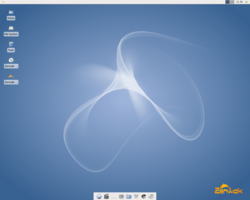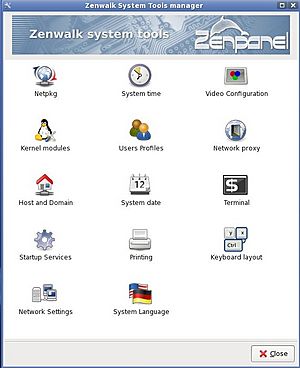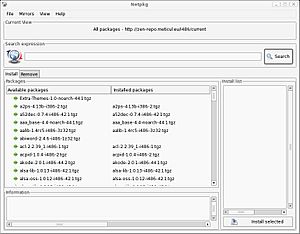Zenwalk facts for kids
 |
|

Zenwalk 6.0
|
|
| Company / developer | Jean-Philippe Guillemin |
|---|---|
| OS family | Linux (Unix-like) |
| Working state | Current |
| Source model | Open source |
| Latest stable release | 15.0-221106 |
| Update method | netpkg (xnetpkg) |
| Package manager | netpkg |
| Kernel type | Monolithic (Linux) |
| Default user interface | Xfce |
| License | Various |
Zenwalk GNU/Linux is a special type of computer operating system. It's built on Linux, which is a very popular and free operating system. Zenwalk was created by Jean-Philippe Guillemin.
It's based on another system called Slackware. Zenwalk is made to be very similar to Slackware, so they work well together. The goal of Zenwalk is to be a modern and useful system for many different tasks. It's great for using internet apps, playing multimedia (like music and videos), and even for programming.
Zenwalk has many special tools. It's designed for everyone, from beginners to advanced users. You can set it up using easy-to-use graphical tools or by typing commands.
Contents
History of Zenwalk
Zenwalk wasn't always called Zenwalk! It started out as Minislack until version 1.1. It got its new name, Zenwalk, with version 1.2. This new version was released on August 12, 2005.
At first, Minislack used a desktop environment called KDE. A desktop environment is what makes your computer screen look and feel the way it does. But with version 0.3, Zenwalk switched to Xfce. Even so, you could always get KDE and GNOME (another desktop environment) separately if you wanted them.
What Zenwalk Aims to Do
The Zenwalk team wants to make a lightweight Linux distribution. This means they want it to be fast and not use too many computer resources. Here's how they try to do that:
- They include only one main app for each task on the installation disc. This keeps the system small.
- They make it work super well with specific computer processors. This helps programs run faster.
- They have a great system for managing software packages. This system helps make sure all the parts a program needs are there.
How Zenwalk Manages Software
Zenwalk uses its own special system for managing software, called netpkg. This system works a lot like other popular package managers, such as apt-get.
Netpkg uses a package format from Slackware, which is called .tgz. But netpkg adds a cool feature: it can figure out if a program needs other parts to work. This is called "dependency resolution." It uses special files to know what each program needs. This makes installing software much easier!
This helpful feature works best with the official Zenwalk websites that store software. Besides the original netpkg, which uses text commands, there's also xnetpkg. This is a graphical version that's easier to use with your mouse.
Zenwalk also works with other Slackware tools like slapt-get. These tools do similar things to netpkg. Zenwalk is designed to be very compatible with Slackware software. This means you can often use Slackware programs on Zenwalk if you need to.
| version | date |
|---|---|
| Minislack 0.1 | May 21, 2004 |
| Minislack 0.2 | August 8, 2004 |
| Minislack 0.3 | February 17, 2005 |
| Minislack 0.4 | March 26, 2005 |
| Minislack 1.0 | April 24, 2005 |
| Minislack 1.0.1 | May 3, 2005 |
| Minislack 1.1 | June 10, 2005 |
| Zenwalk 1.2 | August 12, 2005 |
| Zenwalk 1.3 | October 15, 2005 |
| Zenwalk 2.0 Core | November 27, 2005 |
| Zenwalk 2.0.1 | December 4, 2005 |
| Zenwalk 2.1 (Core) | January 18, 2006 |
| Zenwalk 2.2 | February 16, 2006 |
| Zenwalk 2.4 | April 4, 2006 |
| Zenwalk 2.6 | May 23, 2006 |
| Zenwalk 2.8 | July 21, 2006 |
| Zenwalk 3.0 | September 8, 2006 |
| Zenwalk 4.0 | November 20, 2006 |
| Zenwalk 4.2 | January 6, 2007 |
| Zenwalk 4.4 | February 22, 2007 |
| Zenwalk 4.4.1 | February 24, 2007 |
| Zenwalk 4.6 | June 1, 2007 |
| Zenwalk 4.6.1 | June 6, 2007 |
| Zenwalk 4.8 | October 6, 2007 |
| Zenwalk 5.0 | January 18, 2008 |
| Zenwalk 5.2 | June 7, 2008 |
| Zenwalk 6.0 | March 7, 2009 |
| Zenwalk 6.2 | September 6, 2009 |
| Zenwalk 6.4 | May 27, 2010 |
| Zenwalk 7.0 | Mar 25, 2011 |
| Zenwalk 7.2 | Oct 11, 2012 |
| Zenwalk 7.4 | April 2014 |
| Zenwalk 8.0 | July 2016 |
| Zenwalk 15.0 | 4 February 2022 |
Supported Computer Types
Since version 8.0, Zenwalk Linux is made mainly for 64-bit computers (called x86_64). It no longer supports older 32-bit computers (called i486).
Different Versions of Zenwalk
In the past, there were five main types of Zenwalk:
- Zenwalk Standard: This was the main version for everyday computer use and for developers. It was a complete operating system you could install on your hard drive. It came with many useful software packages. It also included tools for programming and some special media players. The main desktop environment was Xfce.
- Zenwalk Core (no longer made): This version was for users who wanted to build their system from scratch. It didn't come with a graphical interface at first. This allowed skilled users to customize everything.
- ZenLive (no longer made): This was a special version that could run directly from a Live CD. This meant you could try it without installing it on your computer. It even included tools for developing software, which was rare for Live CDs.
- Zenwalk Gnome (no longer made): This version used GNOME as its main desktop environment.
- Zenwalk Openbox (no longer made): This was a very lightweight version. It used Openbox as its window manager. It was designed to be super fast and simple.
Systems Based on Zenwalk
Some other computer systems have been created using Zenwalk as their base. Here are a few:
- Arudius: This was a Live CD system for checking computer security. It's not made anymore.
- SLAMPP: This system was made to be used as a home server.
- Zencafe: This is an Indonesian system designed for internet cafes.
Using Zenwalk from a USB Drive
You can run Zenwalk Linux from a Live USB drive. For older versions (up to 5.2), you could set this up manually or use a tool called UNetbootin. For newer versions, you can use a tool like Ventoy to boot Zenwalk from a USB. However, this is usually just for installing it, not for running a full "live" session.
See also
 In Spanish: Zenwalk Linux para niños
In Spanish: Zenwalk Linux para niños



